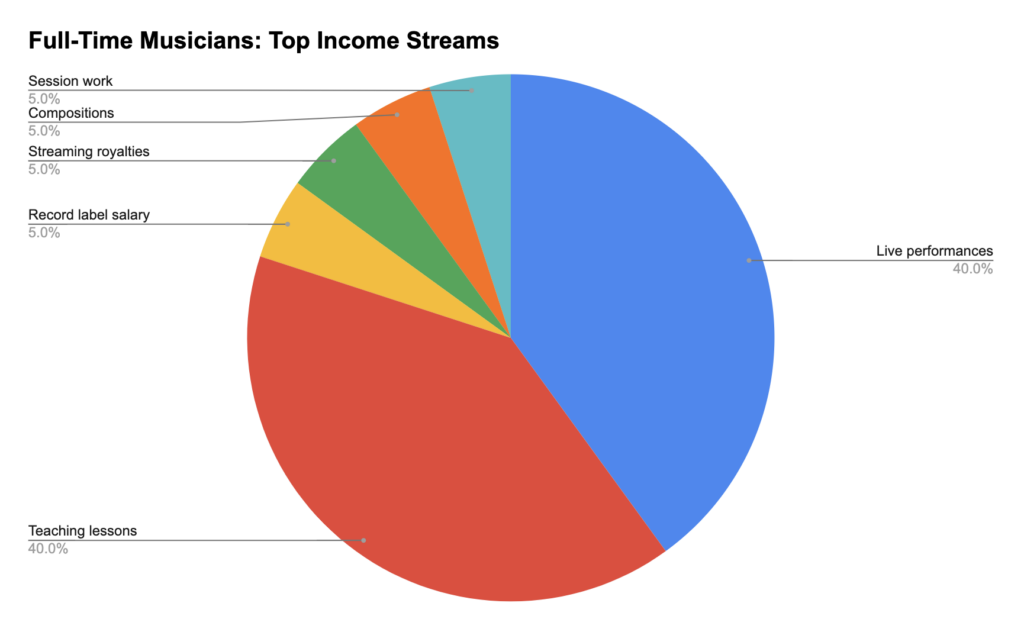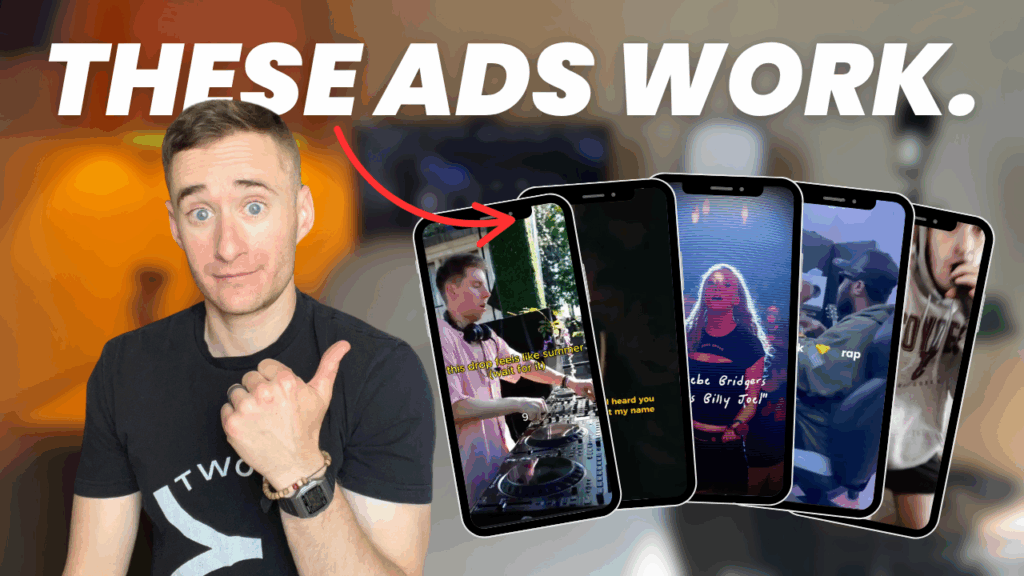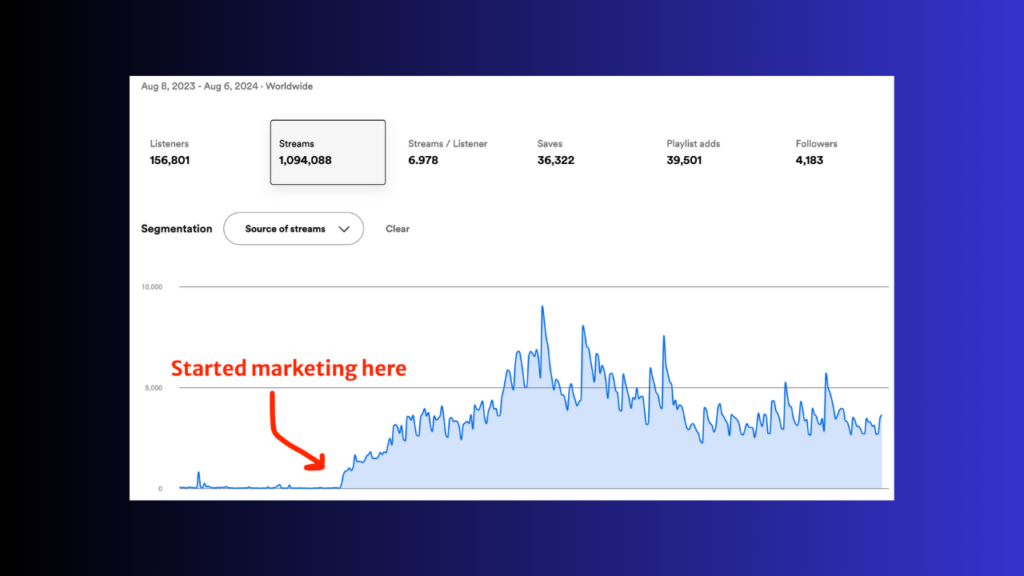$13,327.
That’s how much money the average musician made in 2024, according to my incredibly unscientific (but still very interesting) survey of this very email list.
Honestly, that number is a little higher than I expected, although it overstates things a bit.
The data is a little wobbly with outliers; our highest earner made $50,000 more than our second-highest earner, for instance. Meanwhile, on the other side of things, one out of five respondents made $100 or less.
So the median of our dataset was $1,450. I’d say that’s probably a better representation of reality.
Most of us, in other words, aren’t making enough money to afford a drivable used car – much less quit our day jobs.
But before you shake your fist at the sky and buy an underground bunker, please know that it’s not all doom and gloom. The data also shows that there are multiple ways to make a living from your music. The most common one is unchanged from the 2022 version of this survey:
Play shows!
That’s the most traveled path up the mountain, but it’s far from the only one. Over the rest of this email, I’ll try to give you a glimpse at several others.
But enough chit chat – let’s get into the data.
As you may remember from last week’s email…
I’d initially set a goal of collecting 100 survey responses. And as you may remember from my desperate plea for support this past Friday, we were at 53 responses only three days ago.
I won’t lie: At that point, things looked pretty grim. I’d hoped for valentines and found an empty mailbox.
But you guys answered the bat signal.
We ended up finishing with 113 responses – thank you! While that’s obviously still just a drop in the ocean of all the artists out there, it’s at least a slightly bigger drop in the ocean. It made my heart warm, and more importantly, it made our data just a bit more significant.

Most of those 113 respondents hailed from the US, but we had 20 countries represented in total, with respondents from every continent except Antarctica. (Maybe next time.)
In terms of genre representation, we had a hodgepodge:

The most-tagged category was folk, but the data also includes pretty much every genre you’ve ever heard of, and at least three genres you’d be surprised to know exist.
It’d be kind of interesting to break down income data by genre – maybe at some point I’ll do that – but most of the below analysis will pivot around two other data points:
- Signed artists vs. independent artists
- Full-time artists vs. part-time artists vs. hobbyists
Unsurprisingly, most of our respondents were independent hobbyists.
But we had a fair number of folks who treated music as a serious income stream, too.

These categories are telling. For one thing…
Our four signed artists made, on average, $71,167 in 2024.
Independent artists, on the other hand, made an average of $11,523.
Four signed artists is, admittedly, a tiny subset of our tiny pool of data, so any conclusions I can draw from this will be only anecdotal – but shoot, anecdotally, it sure looks like being signed is one path toward making more money with music.
With that said, some indies did rather well for themselves, too.
Our top indie earner made $100,000 last year, and six indies made $50,000 or more. That’s probably enough for those people to afford rent – or at least to buy a used car that could be driven off the lot.
Top-line numbers aside, how our top earners drove income is particularly interesting.
Virtually every musician who responded to our survey listed streaming royalties as one of their income streams:

But only one out of 20 full-time musicians listed streaming royalties as their top income stream.
In other words, for most full-time artists, Spotify doesn’t pay the bills. Shocking, I know.
Instead, most people who make music full-time list either live performances or teaching lessons as their top income stream.

People who make music as a hobby, on the other hand, were much more likely to list streaming royalties as their top income stream.

Very few artists appear to make the main part of their income from merchandise sales or crowdfunding. That’s a bit sad, because digital marketers (like me) love to talk about the upside of merch marketing funnels and Patreon pages.
It doesn’t seem like these tactics live up to the hype.
Sales of compositions (which includes sync licensing) were something of a mixed bag.
- On the positive side, eight of our 20 full-time musicians listed compositions as one of their income streams.
- On the negative side, only one musician – who, incidentally was not a full-time musician – listed compositions as their highest income stream.
Again, this is anecdotal at best, but the story I’m reading is that sync is best treated as a nice supplementary source of income rather than as the primary means by which you pay rent.
And that leads me to a few of my overall takeaways.
I’m going to spew these out in bullet-point form, so buckle up…
- If you want to make a career from your music, build multiple income streams. The average full-time musician had four streams of income associated with their music.
- Services are easier to sell than products. If you’re an artist and you only sell music and merch – but don’t play live, do sessions, or teach lessons – it’ll be harder to make your living from your music. I’ve found this concept to be true in my own business, too.
- Crowdfunding isn’t commonly used, but it does seem to be effective. Nobody listed crowdfunding as their top income stream, and only five musicians crowdfunded at all. But of those five musicians, the average income from music was $20,876. Correlation or causation – who knows? But it’s twice the overall average.
- Streaming is the lowest-hanging fruit – and, unsurprisingly, it’s one of the least financially rewarding. It should be part of the pie, but probably not the whole thing.
- It’s way easier to make a living if you play live shows. That’s just the reality. (I happen to think it’s probably an overall societal good.)
- If you want to be rich, you should probably pick another line of work. Our top earner reported $150,000 in income last year. That’s more than solid, but it’s not enough to crack the Forbes list anytime soon – and, as mentioned at the top of this piece, it’s also an outlier. If your main goal is money, you’re better off in B2B sales or something.
Okay, let’s cut it there.
I could keep going; there are so many ways to split the data. But the overall takeaway I want to leave you with is this:
You can make a full-time living from your music.
Our survey is a drop in the wide ocean, but it does prove that, at least. There are paths up the mountain.
No, it’s not easy, and yes, it’ll probably take more hard work than it should, and not a little imagination, too. But it is doable. More than that, it’s worth doing.
Your music matters. Here’s wishing you the good reward of being compensated for it.
– Jon









